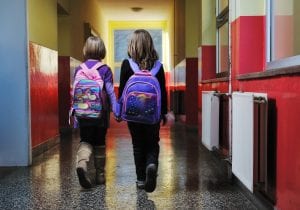Every day, children in the United States experience sexual abuse. It’s difficult to determine how widespread this problem is because child sexual abuse is not uniformly defined and most certainly under-reported. The best data available tells us that more than 25 percent of girls and 5 percent of boys experience sexual abuse at some point during their formative years.
Any form of sexual abuse during childhood has serious negative consequences. Children who have been abused are more likely to have problems at school, as well as trouble sleeping and eating. They are at a high risk for experiencing anxiety, depression, alcoholism, drug abuse, and insomnia throughout their lives.
Educators are working on addressing the problem. The most widely-used prevention strategy employs school-based programs that teach kids what’s okay and where to go for help. A systematic review published by the Cochrane Collaboration evaluated the effectiveness of these types of programs.
The review included 24 studies that evaluated intervention programs delivered in schools in seven countries. More than 5,800 students in elementary, middle and high schools participated in the studies. Programs included the teaching of safety rules, body ownership, private parts of the body, distinguishing types of touches and types of secrets, and who to tell.
Researchers found that these types of programs helped children to learn behaviors that would help them avoid sexual abuse encounters, and that participants remembered what they learned up to six months after the program.
Participants did not feel more anxious or fearful after the programs. And children who participated were more likely to tell an adult about abuse compared to those who did not participate in a program. One problem may be that these types of school programs often focus on “stranger danger,” when, in reality, most sexual abuse of children is committed by someone the child knows.
A narrative review published in the journal Child Maltreatment suggests that encouraging good parenting practices may be a more effective way to prevent child abuse for several reasons.
First, parents have the greatest ability to create safe environments for their children, reducing the likelihood of abuse. A child who has experienced abuse is more likely to tell a parent with whom they have a secure, loving relationship, which gives the parents the opportunity to prevent future abuse. In addition, the research documents that when children have secure relationships with their parents, it improves their self-confidence and overall well-being. Research documents that abusers are less likely to target children with these attributes.
The review suggests that adding a component about sexual abuse to parenting education programs, developing media campaigns about preventing sexual abuse focused on parents, and even requiring schools to send home information packets about the role parents play in preventing sexual abuse could be helpful.
The take-home message: While school-based programs give children some knowledge about sexual abuse and tools to prevent it, researchers are still looking for more effective ways to prevent child sexual abuse. Teaching parents to build strong relationships with their children and supervise their children carefully may be the key.
Please visit Cornell University’s Bronfenbrenner Center for Translational Research’s website for more information on our work solving human problems.




Speak Your Mind